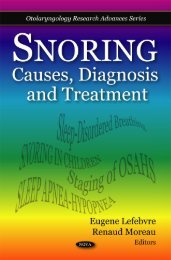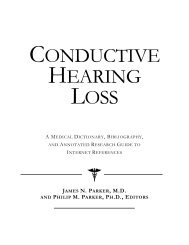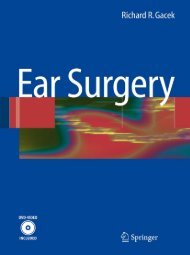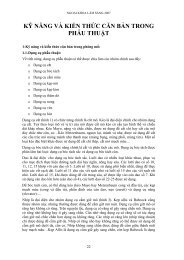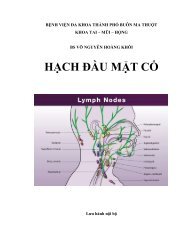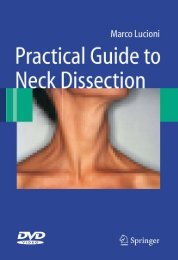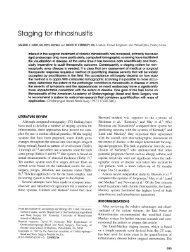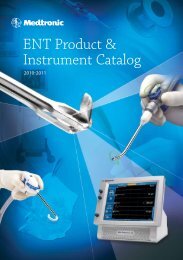Familial Nasopharyngeal Carcinoma 6
Familial Nasopharyngeal Carcinoma 6
Familial Nasopharyngeal Carcinoma 6
- No tags were found...
You also want an ePaper? Increase the reach of your titles
YUMPU automatically turns print PDFs into web optimized ePapers that Google loves.
142 R. Ove, R. R. Allison, and J. J. LuTable 10.3. Survival for stage II patients treated with radiotherapy aloneReference Location Patients Staging Brachy f/u (year) SurvivalChang et al. (1996) Taiwan 183 a AJCC77 Yes 5 86%Cooper et al. (1998) US 33 AJCC97 No 3 65%Ozyar et al. (1999) Turkey 21 AJCC97 No 3 72%Chua et al. (2003a, b) Hong Kong 91 AJCC97 No 10 60% DSSLeung et al. (2005) Hong Kong 398 AJCC97 No 5 92%A,78%BYen et al. (2005) Taiwan 325 AJCC97 Yes 5 72%Lu et al. (2005) China 215 Chinese No 4 91%Cao et al. (2007) China 268 Chinese Yes 5 81–93%Fang et al. (2008) Taiwan 78 AJCC97 No 3 80–89%Tham et al. (2009) Singapore 52 AJCC97 Yes 3 88%Xiao et al. (2009) China 300 Chinese Yes 5 85%Two survival numbers appear for one series, which reflects the survival for stage IIA and IIB disease (overall stage II notreported)DSS disease-specific survival. Overall survival not reportedaT1-T2N0 mixed for this publicationOf these 44 patients, 32 received concurrent chemoradiation,to a dose of 70 Gy with standard fractionationand concurrent cisplatin and 5-FU. The patientstreated with radiotherapy alone were primarily stageI. The locoregional control rate and disease-free survivalat 3 years for the stage II chemoradiotherapygroup was no worse than that of the stage I patientstreated with radiotherapy alone, with 100% localcontrol for the chemoradiation stage II group. Patientnumbers in this retrospective data were relativelylow to make firm conclusions (Table 10.3).Neoadjuvant chemotherapy was employed in multipletrials in endemic areas, with mixed results overall,and some of these included early stage patients.The results of two phase III induction trials performedin Hong Kong were pooled, with the earlystage patients combined and analyzed (Chua et al.2006). The subgroup analysis pooled data from trialsincorporating platinum, bleomycin, and 5-FU followedby radiotherapy, compared with radiotherapyalone. The patients were restaged according to theAJCC 1997 system. A total of 784 patients wereincluded. Surprisingly, differences in survival, localcontrol, and metastases were only seen in the stage I/II patients. All the patients in the stage I/II group hadstage IIb disease (parapharyngeal space invasion orN1). The 5-year survival rate was 79% in the combinedmodality arm and 67% in the RT-alone arm (p= 0.048). Local control was unchanged, but distantmetastasis-free survival was 86% when comparedwith 74% (p = 0.0053). A weakness of this study is thelack of concurrent chemotherapy, and the failure tosee any improvement with the addition of chemotherapyfor higher stage patients.A recent analysis from Seoul, Korea, reported onthe outcomes of 60 early stage nasopharyngeal cancerpatients treated with radiotherapy alone or combinationchemotherapy and radiotherapy (Songet al. 2008). Twenty-nine patients received inductionchemotherapy, in most cases with cisplatin and 5-FU.Concurrent chemotherapy was not used. One patientreceived carboplatin, and two received docetaxel aspart of the induction regimen. Of the 60 patients, 17were AJCC 1997 stage I or IIa, and 43 were stage IIb,equally distributed between the groups. There wasno significant difference in survival, local control,metastases, or disease-free survival, and results werenumerically superior in the radiotherapy alonegroup. The patients receiving chemotherapy weretreated at later dates (after 1996) predominantly, butotherwise the groups were relatively well balanced. Inmultivariate analysis, delay in the onset of radiotherapywas significantly associated with locoregionalfailure in the IIb patients (p = 0.044). Weaknesses ofthis study include being retrospective, as selectionbias may have favored adding chemotherapy for




